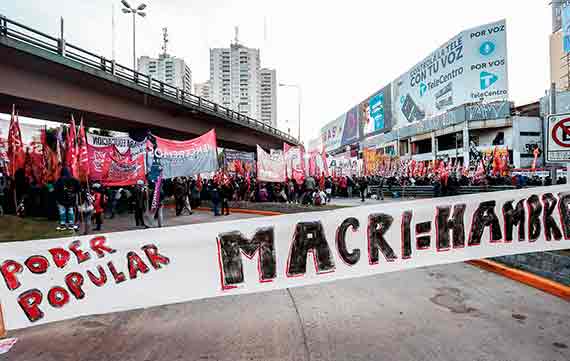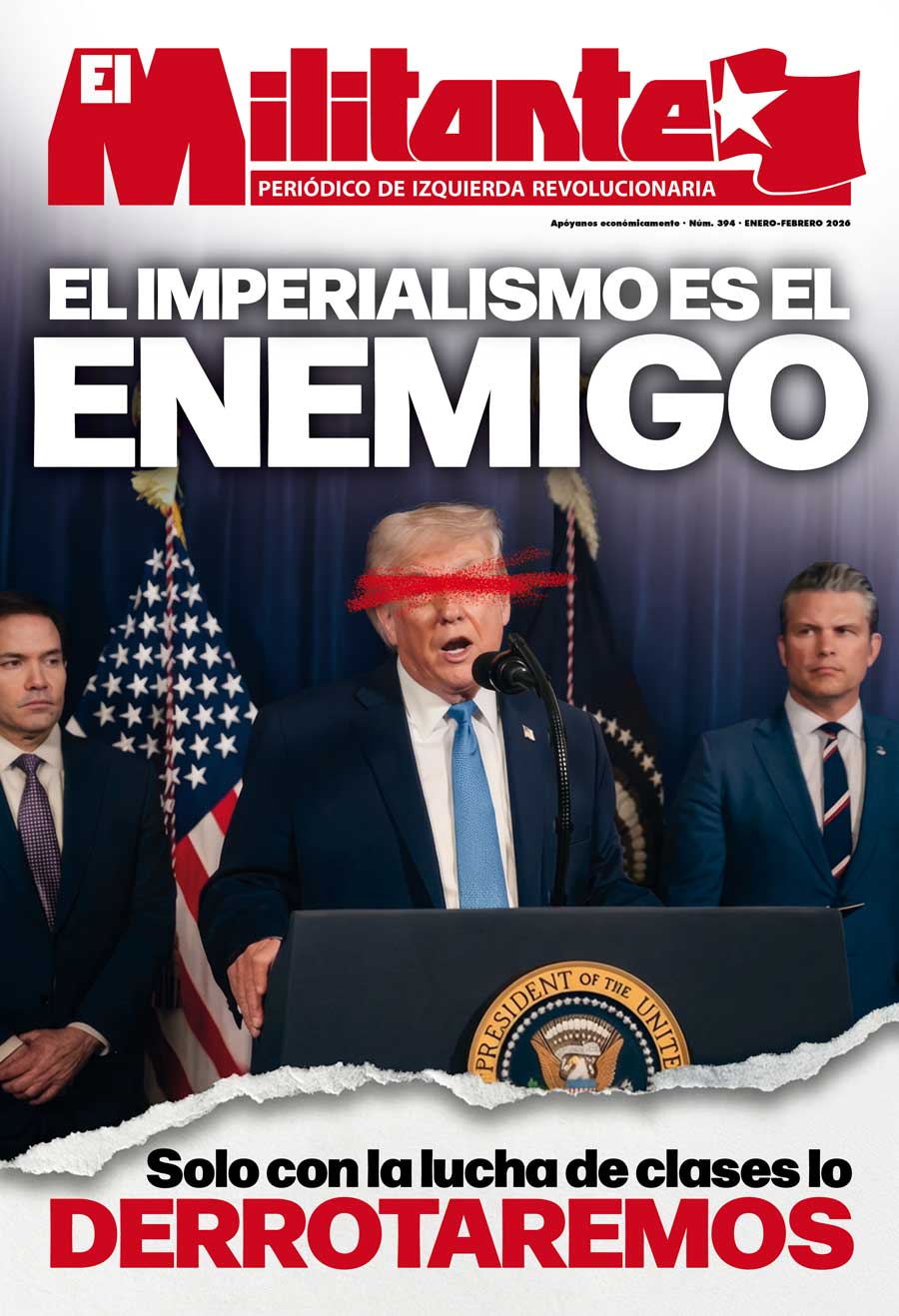The Argentine president, Mauricio Macri, suffered a resounding defeat in the primary elections held in Argentina on August 11th: the Peronist candidacy led by Alberto Fernández and Cristina Fernández de Kirchner won the victory, surpassing Macri´s results by four million (12,205,885 votes and 47.79% for the Frente de todos (Front of All) and 8,121,596 and 31.80 for Juntos por el cambio (Together for the change)). A debacle that reflects above all the enormous mass movement which has travelled throughout Argentina for the last four years against the cuts, austerity and agreements reached with the IMF which have socially devastated the country.
The resistance in the streets, the massive mobilizations of pensioners, students and teachers, the rebellion of working women for abortion rights, the general strikes... all this has as a result Macri´s government suspended in the air, experiencing a devastating economic crisis and with the working class in a clear attitude of answering back all the attacks struggling in the streets.
The economy is sinking
Since the primary elections, the economy of the country has continued to deepen its journey to hell. Drowned by the crisis, which already reaches 65% annually, the unstoppable fall of the Argentine peso in relation with the dollar (on Friday August 30th it exceeded 61 units per dollar, compared to the 45 on August the 9th), the weight of the public debt - close to 100% of GDP - and the exorbitant interest around 85% that must be paid for it, the Argentine economy is on the edge of the cliff.
It is impossible for Argentina to assume the payment of the debt and the credit of 57,000 million dollars which the IMF granted in 2018. The suspension of payments is still not official but it is a fact. On Wednesday the 28th of August the Minister of Finance, Hernán Lacunza, asked the IMF and all its institutional creditors for a delay in the payment of the debt for “liquidity difficulties” and subsequently a plan for restructuring it for an amount bigger than 100,000 million dollars.
Macri presented himself as the saviour of Argentina. He had the backing of the bourgeoisie and landowners, multinationals and the US Government. With his electoral victory in 2015, US imperialism seemed to take an important step on the way to re-count governments under its strict control throughout Latin America. It was also the signal for many political and so called "Marxists" to cry out about the "right turn" in the continent and the "low level of consciousness" of Argentine masses.
Less than four years later, Macri has steadily led the country towards an economic collapse whose consequences could be greater than those of crisis in 2001, including a revolutionary social outbreak with profound continental effects. His failure is also the failure of imperialism.
Inequality, hunger and class struggle. The context of the presidential elections
The balance of the four years of Macri´s management leaves no doubt. Poverty, according to the Permanent Household Survey (EPH), reached up in March 2019 to 14 million people in Argetina, 35% of the population. The 7th of June we could read the following in the newspaper ‘El País’: “In 2018, the shortage in children's age rose to 51.7% and 13% of children went hungry, according to the Catholic University (…) One in two Argentine minors are poor and one in ten go hungry in a country that exports food for 400 million people.” All analysts agree that these percentages will increase significantly in the coming months. The situation is so serious that the Argentine church asked the political corpse that occupies the Casa Rosada to declare food emergency.
In this background of social debacle, Argentine workers, youth and the most disadvantaged sectors are starring in constant mobilizations. Some of the most significant were those of August the 22nd and 28th when hundreds of thousands of protesters toured the streets of the main Argentine cities, summoned by social movements and combative and class unions.
Macri’s Government desperately tries to manoeuvre and avoid an outbreak, following the guidelines of imperialism and the oligarchy. To this end, it has adopted some cosmetic measures, such as reducing taxes on the "middle classes", symbolically raising the minimum wage and extending the deadline for small businesses to pay some taxes...
But these manoeuvres are not going to stop the masses in Argentina. Nor is the policy followed by the bureaucratic leaderships of the main Peronist unions, the CGT and CTA, which try by all means to put a break to the struggles by concentrating their sterile efforts on negotiating tables, and behaving in reality as crutches of a dying government.
The Argentine working class, which has stood up against this Government from the its very beginning and starred since 2015 five general strikes, has once again taken the streets with a redoubled force, threatening to blow up the fragile statu quo that the official leadership of Peronism intends to impose.
The Peronist candidate for the Frente de Todos, Alberto Fernández, while criticizing Macri's policy with a low tone to hold him responsible for the disaster that is going through the country, sends reassuring messages to the capitalists and the IMF itself about the measures to be applied if, as it seems most likely, he accedes to the presidency of Argentina in the elections of October 27th.
He’s intended to continue paying the debt, renegotiating terms and conditions and respecting and safeguarding the interests of national and foreign capitalists at all times. That is why he has given up on a coherent struggle response, and has established a united front with the union bureaucracy flatly refusing to push the general strike to get Macri out of power. The reasons are obvious: feeding the class struggle and the independent action of workers can provoke a revolutionary crisis that puts Peronism in a critical situation and splits it into class lines.
The goal of the Government is to remain until the presidential elections. Despite the help received from the leaders of the CGT, the CTA and Alberto Fernández, the political, economic and social crisis is so deep that it is not certain that it will succeed.
Every single one of them (the bourgeoisie, IMF, Government, union leaders and Alberto Fernández himself), intend to canalize the social rebellion that is taking place in Argentina, towards October elections, the proclamation of a new president and the constitution of another Government. Trying to give a “parliamentary” exit to this catastrophic situation will not solve anything. The Argentine population has gone through a hard school and, despite the illusions in a new Peronist government; it will not be satisfied with speeches. The population wants a radical change which ensures an escalation of direct action by the masses to achieve it.
The revolutionary left and its tasks
It is evident that the electoral channel which expresses years of social discontent and mass mobilization against Macri is Peronism. But this does not mean that the working class has given a blank check to Alberto Fernández.
The more than likely future president and his Government will be subjected to enormous pressures, caught by the economic catastrophe and the decision of struggle of the masses. The Argentine bourgeoisie and imperialism will demand to continue with the policy applied by Macri, a requirement that Alberto Fernández will have no problem to attend. But the experience of these years has been very useful: the working class and youth will forcefully demand real and effective measures to end unemployment, inflation, job insecurity and poverty. The prospect of a revolutionary crisis in Argentina is making its way inexorably.
The main force of the left that claims itself Marxist in Argentina is the Front of the Left and of the Workers-Unity (FIT-U). This electoral coalition, made up of the Socialist Workers Party (PTS), the Workers Party (PO), the Socialist Left (IS), and the Socialist Workers Movement (MST), won more than 700 thousand votes, being able to fundamentally maintain the electoral ground conquered in the previous elections. In its ranks and among its supporters there are thousands of revolutionaries and fighters, who are part of the forefront sectors of the working class. The number of votes obtained but, above all, its influence in the struggles and mobilizations in Argentina, reflect the existence of ample space to continue building the revolutionary forces.
The FIT could become the organization that brings together the decisive sectors of the working class. In order for this to be possible, in addition to defending a revolutionary program, it is necessary to know how to establish an adequate tactic to conquer the masses that march behind the Peronist formations, especially those that have turned to left in these years both in the trade union front as in social movements.
The FIT-U must work coherently and concretely for the united front with the tendencies and combative affiliates of the Peronist unions and social organizations, jointly promoting mobilization and constructively and positively defending the socialist program, breaking with any kind of sectarianism. To tar all the sectors of Peronism with the same brush without building a bridge to gain influence within the left and in the social base of this movement, would mean to lift an obstacle between the FIT and broad sectors of the masses. The principled criticism of the reformist and pro-capitalist leaders of the ruling Peronism is not at odds with a fraternal tactic that builds the unity of action in the struggle with millions of Peronist workers who, in addition to the current Argentine context, are very permeable to the slogans and revolutionary claims.
To solve the fundamental problems of the masses, it is essential to defend and fight for a socialist program and present it with energy and confidence. A program that starts from the demands and immediate needs of the masses, and that when developing it, links with the measures that would suppose the organization in socialist lines of the Argentine economy and society.
It is necessary to defend that no salary can be below the cost of the basic family basket, the mobile price-wage scale so that inflation does not eat the income of working families and that the same measure is applied to pensions. To fight for the cancellation of the increases in transport, light and fuel, demanding the nationalization of all these strategic sectors under the democratic control of the working class. To defend public health and education system with an emergency program. To fight against unemployment based on the occupation and start-up of any company that closes or dismisses and to require its nationalization under workers' control.
Fighting for the end of capital flight that speculators and monopolies are leading implies, in the first place, to stop paying the external debt and, secondly, to nationalize the financial and banking system under the democratic direction and control of the workers, to preserve the savings of the population and to use these fabulous resources in urgent measures against poverty and social exclusion. Only the socialist planning of the economy can guarantee decent living conditions.
The state monopoly of foreign trade is also necessary to prevent a handful of exporters from handling the liquidation of currencies at will.
In short, we need to throw out Macri and to end with the government of the oligarchy and capital through the revolutionary mobilization of the workers, to create the conditions of an alternative and socialist workers power.
Argentina has entered a decisive period of great clashes between classes and opportunities to raise a revolutionary, socialist and internationalist alternative that will have an electric effect throughout Latin America and the rest of the world.





















































